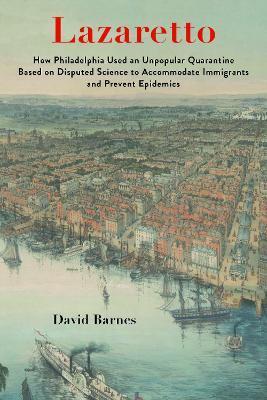Lazaretto: How Philadelphia Used an Unpopular Quarantine Based on Disputed Science to Accommodate Immigrants and Prevent Epidemic

Lazaretto: How Philadelphia Used an Unpopular Quarantine Based on Disputed Science to Accommodate Immigrants and Prevent Epidemic
How the controversial practice of quarantine saved nineteenth-century Philadelphia after a series of deadly epidemics.
In the 1790s, four devastating yellow fever epidemics threatened the survival of Philadelphia, the nation's capital and largest city. In response, the city built a new quarantine station called the Lazaretto downriver from its port. From 1801 to 1895, a strict quarantine was enforced there to protect the city against yellow fever, cholera, typhus, and other diseases. At the time, the science behind quarantine was hotly contested, and the Board of Health in Philadelphia was plagued by internal conflicts and political resistance. In Lazaretto, David Barnes tells the story of how a blend of pragmatism, improvisation, and humane care succeeded in treating seemingly incurable diseases and preventing further outbreaks.
Barnes shares the lessons of the Lazaretto through a series of tragic and inspiring true stories of people caught up in the painful ordeal of quarantine. They include a nine-year-old girl enslaved in West Africa and freed upon arrival in Philadelphia, an eleven-year-old orphan boy who survived yellow fever only to be scapegoated for starting an epidemic, and a grieving widow who saved the Lazaretto in the midst of catastrophe. Spanning a turbulent century of immigration, urban growth, and social transformation, Lazaretto takes readers inside the life-and-death debates and ordinary heroism that saved Philadelphia when its survival as a city was at stake. Amid the controversy and tragedy of the COVID-19 pandemic, this surprising reappraisal of America's historic struggle against deadly epidemics reminds us not to neglect old knowledge and skills in our rush to embrace the new.
PRP: 343.09 Lei
Acesta este Pretul Recomandat de Producator. Pretul de vanzare al produsului este afisat mai jos.
308.78Lei
308.78Lei
343.09 LeiLivrare in 2-4 saptamani
Descrierea produsului
How the controversial practice of quarantine saved nineteenth-century Philadelphia after a series of deadly epidemics.
In the 1790s, four devastating yellow fever epidemics threatened the survival of Philadelphia, the nation's capital and largest city. In response, the city built a new quarantine station called the Lazaretto downriver from its port. From 1801 to 1895, a strict quarantine was enforced there to protect the city against yellow fever, cholera, typhus, and other diseases. At the time, the science behind quarantine was hotly contested, and the Board of Health in Philadelphia was plagued by internal conflicts and political resistance. In Lazaretto, David Barnes tells the story of how a blend of pragmatism, improvisation, and humane care succeeded in treating seemingly incurable diseases and preventing further outbreaks.
Barnes shares the lessons of the Lazaretto through a series of tragic and inspiring true stories of people caught up in the painful ordeal of quarantine. They include a nine-year-old girl enslaved in West Africa and freed upon arrival in Philadelphia, an eleven-year-old orphan boy who survived yellow fever only to be scapegoated for starting an epidemic, and a grieving widow who saved the Lazaretto in the midst of catastrophe. Spanning a turbulent century of immigration, urban growth, and social transformation, Lazaretto takes readers inside the life-and-death debates and ordinary heroism that saved Philadelphia when its survival as a city was at stake. Amid the controversy and tragedy of the COVID-19 pandemic, this surprising reappraisal of America's historic struggle against deadly epidemics reminds us not to neglect old knowledge and skills in our rush to embrace the new.
Detaliile produsului








